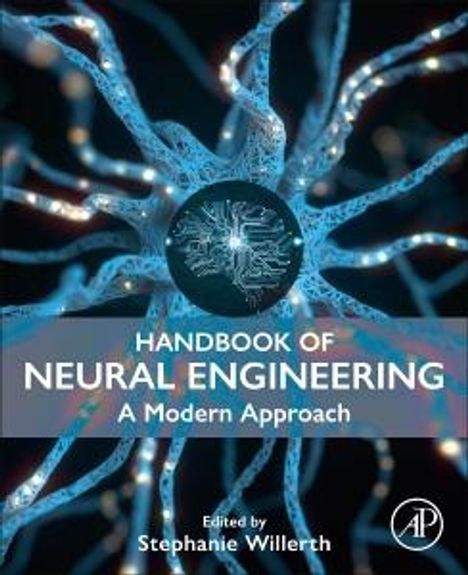Handbook of Neural Engineering
Handbook of Neural Engineering
Buch
- A Modern Approach
- Herausgeber: Stephanie Willerth
Lieferzeit beträgt mind. 4 Wochen
(soweit verfügbar beim Lieferanten)
(soweit verfügbar beim Lieferanten)
EUR 258,27*
Verlängerter Rückgabezeitraum bis 31. Januar 2025
Alle zur Rückgabe berechtigten Produkte, die zwischen dem 1. bis 31. Dezember 2024 gekauft wurden, können bis zum 31. Januar 2025 zurückgegeben werden.
- Elsevier Inc, 09/2024
- Einband: Kartoniert / Broschiert
- Sprache: Englisch
- ISBN-13: 9780323957304
- Bestellnummer: 11746683
- Umfang: 678 Seiten
- Gewicht: 1361 g
- Maße: 242 x 188 mm
- Stärke: 34 mm
- Erscheinungstermin: 27.9.2024
Achtung: Artikel ist nicht in deutscher Sprache!
Klappentext
Handbook of Neural Engineering: A Modern Approach provides a comprehensive overview of the field from biology to recent technological advances through an interdisciplinary lens. The book is divided into three sections: 1) Biological Considerations for Neural Engineering, 2) Neural Engineering Strategies, and 3) Emerging Technologies for Neural Engineering. The Handbook is accessible to upper-level undergraduate students, graduate students, scientific researchers, clinicians, neural engineers, and professionals working in industry. As the field of Neural Engineering is emerging, new technologies have emerged as strategies for treating neurological diseases and disorders which will be discussed alongside established technologies such as neural interfaces and neural prostheses. Handbook of Neural Engineering is the first comprehensive text that addresses this combination of subjects. Neurodegenerative diseases, including Alzheimer s, Parkinson s and Multiple Sclerosis, represent an enormous healthcare burden, and many of these diseases lack true cures, making it imperative to study the biological systems that become disordered to understand potential treatment options. The COVID-19 pandemic dramatically illustrated the need for trained Biomedical Engineers, as this rapidly growing field applies the principles of engineering design for applications in human health. Neural Engineering a subset of Biomedical Engineering focuses on the study and understanding of the nervous system and the development of strategies to repair or regenerate diseased or damaged neural tissue or enhance the function of the nervous system. Most of the major neurological diseases and disorders lack true cures, generating a large burden on the healthcare system and the patients suffering from these conditions. Neural Engineering can help to address these burdens caused by Alzheimer s disease, Parkinson s disease, traumatic brain injury and other conditions. One of the major areas of interest is studying how non-living components interact with the nervous system, and this work requires an in-depth knowledge of both the engineering components and constraints as well as an understanding of the biology present in the nervous system. Thus, there is a need for a foundational Handbook of Neural Engineering to cover the topics relevant to this field in order to address this growing area of research. Handbook of Neural Engineering covers the basic neurobiology and physiology, common neural engineering strategies, and emerging technologies in this field. It is designed to support an upper year / graduate elective course in neural engineering, and will provide a foundational overview of the field for interdisciplinary researchers, clinicians, engineers, and industry professionals. The handbook provides readers with a strong base in both biological and engineering principles along with the concepts necessary to implement solutions using Neural Engineering.
Handbook of Neural Engineering
EUR 258,27*

